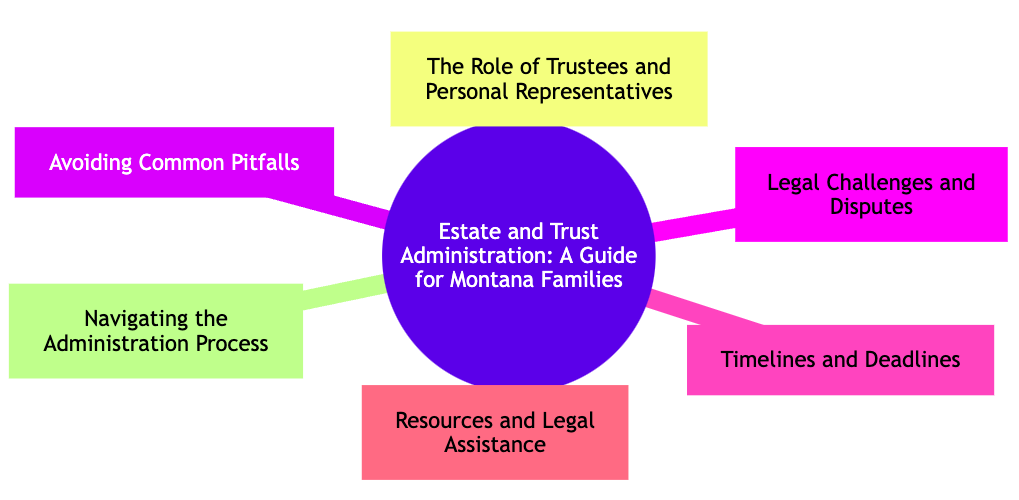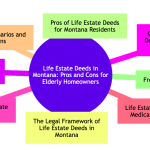Navigating estate planning in Montana requires understanding the various tools at your disposal, one of which is the life estate deed.
This legal arrangement offers a unique approach to managing property ownership and inheritance, tailored to the needs of elderly homeowners. It blends the desire for control during one's lifetime with the assurance of a predetermined transfer of property upon death. As Montana's population ages, the relevance of life estate deeds in estate planning becomes increasingly significant, offering a blend of benefits and challenges tailored to the unique landscape of Montana law and real estate.
Key Takeaways
- Life estate deeds allow property owners to transfer ownership after death without going through probate.
- They provide a way to ensure that a specific heir inherits property, while the original owner retains use during their lifetime.
- In Montana, life estate deeds can be a strategic tool for Medicaid planning, potentially protecting assets.
- However, they limit the owner's ability to sell or mortgage the property without the consent of the future owner.
- Understanding the specific legal implications in Montana is crucial for effectively utilizing a life estate deed.

What is a Life Estate Deed?
A life estate deed is a legal document that changes property ownership under specific conditions. It splits property rights into two types: the life estate and the remainder interest. The life estate interest allows the current owner, or "life tenant," to continue living on the property and using it during their lifetime. Upon their death, the property automatically passes to the designated "remainderman," without the need for probate court proceedings. This setup provides a seamless transition of property ownership while ensuring the life tenant's right to use and enjoy the property for the rest of their life.
In Montana, life estate deeds are particularly appealing for several reasons. They offer a straightforward way to manage estate planning by avoiding the complexities and costs associated with probate. This is especially valuable in a state like Montana, where rural properties and family homes often carry significant emotional and financial value. Additionally, life estate deeds can be used as part of a broader strategy for Medicaid planning, allowing elderly homeowners to potentially protect their assets while ensuring they qualify for long-term care benefits. However, the use of life estate deeds requires careful consideration of the pros and cons, as well as a thorough understanding of Montana's specific legal landscape.
The Legal Framework of Life Estate Deeds in Montana
Montana's legal framework for life estate deeds provides a structured approach to property management and inheritance, ensuring that property owners can pass on their assets without the complexities of probate court. To establish a life estate deed in Montana, the property owner must prepare a deed that specifies the life tenant and the remainderman. This deed must be properly executed, often requiring notarization, and then filed with the county recorder's office where the property is located. The process underscores the importance of clarity in the deed's language to prevent future disputes and ensure the property's smooth transfer upon the life tenant's death.
Comparison of Life Estate Deeds: Montana vs. Other States
|
State |
Probate Avoidance |
Medicaid Planning |
Revocability |
Tax Implications |
|
Montana |
Yes |
Yes, with limitations |
Generally irrevocable without consent |
Possible capital gains tax for remainderman |
|
California |
Yes |
Yes, with planning |
Varies, often irrevocable |
Possible reassessment for property tax |
|
Florida |
Yes |
Yes, favorable for Medicaid |
Irrevocable without consent |
No capital gains tax due to a stepped-up basis |
|
New York |
Yes |
Yes, but complex |
Generally irrevocable |
Potential estate tax implications |
This table highlights the nuances of life estate deeds across different states, showcasing Montana's unique position in terms of probate avoidance and Medicaid planning.
Pros of Life Estate Deeds for Montana Residents
Life estate deeds offer Montana residents a unique blend of benefits, streamlining the process of transferring property and ensuring peace of mind for both the life tenant and the remainderman.
- Avoids Probate: The property passes directly to the remainderman upon the life tenant's death, bypassing the time-consuming and costly probate process.
- Immediate Transfer: Upon the life tenant's death, the property transfer is immediate, providing clarity and certainty for all parties involved.
- Medicaid Planning: Can be structured to potentially protect the property from being counted as an asset for Medicaid eligibility, if done five years before applying.
- Preserves Family Legacy: Ensures that family homes or lands remain within the family, according to the original owner's wishes.
- Financial Planning: Allows the life tenant to plan for future financial needs, knowing the property's final disposition is predetermined.
Cons of Life Estate Deeds for Elderly Homeowners
While life estate deeds offer significant advantages, they also come with drawbacks that elderly homeowners in Montana must consider.
- Loss of Control: Once a life estate deed is established, the life tenant cannot sell, mortgage, or otherwise dispose of the property without the remainderman's consent.
- Irrevocability: Changing a life estate deed typically requires agreement from all parties involved, making it difficult to adapt to changing circumstances.
- Financial Responsibility: The life tenant remains responsible for property taxes, insurance, and maintenance, which can be a financial burden.
- Potential Family Conflict: The fixed nature of a life estate deed can lead to disputes among family members, especially if relationships change.
- Tax Implications: The remainderman may face capital gains tax based on the property's value at the time of the original owner's death, not its value when they eventually sell it.
These considerations highlight the importance of careful planning and legal advice when establishing a life estate deed in Montana, ensuring that it aligns with the homeowner's overall estate planning goals.
Find A Trusted Elder Law Attorney in Montana - Montana Elder Law
Elder Law workshop presented by Montana Elder Law.
Comparing Life Estate Deeds with Other Estate Planning Tools
Estate planning in Montana offers various tools, each with unique features and benefits. Understanding how life estate deeds stack up against these alternatives can guide homeowners in making informed decisions.
Trusts vs. Life Estate Deeds
Trusts offer flexibility that life estate deeds do not. With a trust, you can change beneficiaries, stipulate conditions, and even manage the property if incapacity occurs. Life estate deeds, on the other hand, provide a straightforward transfer of property upon death but lock in decisions once made. Trusts are ideal for those seeking control and flexibility, while life estate deeds suit those with straightforward wishes for their property after death.
Joint Tenancy vs. Life Estate Deeds
Joint tenancy allows property ownership by two or more individuals with rights of survivorship, meaning the property automatically passes to the surviving owner(s) upon death. Unlike life estate deeds, joint tenancy offers simplicity for co-owners but lacks the ability to specify a non-owner remainderman. Life estate deeds are preferable for ensuring property passes outside the immediate circle of ownership.
Transfer on Death Deeds vs. Life Estate Deeds
Transfer on death (TOD) deeds, like life estate deeds, avoid probate by naming a beneficiary to receive property upon the owner's death. However, TOD deeds offer more flexibility, allowing the owner to change the beneficiary without consent. For those seeking a balance between avoiding probate and retaining control, TOD deeds may be the better choice.
How to Set Up a Life Estate Deed in Montana
Establishing a life estate deed in Montana involves clear steps to ensure legal validity and the intended outcome.
- Consult an Attorney: Begin with professional advice to navigate Montana's specific legal requirements.
- Draft the Deed: Include detailed information about the life tenant, remainderman, and the property.
- Execute the Deed: Both the life tenant and remainderman must sign the deed, typically in the presence of a notary.
- Record the Deed: File the signed deed with the county recorder's office where the property is located to make it official.
Comparison of Estate Planning Methods
|
Method |
Flexibility |
Probate Avoidance |
Control During Life |
Post-Death Control |
|
Life Estate Deed |
Low |
Yes |
Limited |
None |
|
Trust |
High |
Yes |
Complete |
Adjustable |
|
Joint Tenancy |
Moderate |
Yes |
Shared |
None |
|
TOD Deed |
High |
Yes |
Complete |
None |
This table illustrates the key differences in helping Montana residents choose the right estate planning tool.
Life Estate Deeds and Medicaid Planning
Life estate deeds can play a strategic role in Medicaid planning, offering a way to potentially protect the home from being considered an asset. By transferring the remainder of interest in the property, homeowners might qualify for Medicaid without selling their home. However, this strategy requires careful timing—transfers must occur at least five years before applying for Medicaid to avoid penalties. Despite these benefits, the irreversible nature of life estate deeds means homeowners must plan meticulously, considering future needs and eligibility requirements.
Real-Life Scenarios and Solutions
Montana homeowners face various situations where life estate deeds can offer solutions or present challenges.
- Scenario: A homeowner wants to ensure their child inherits the family home but needs Medicaid for long-term care.
- Solution: Establish a life estate deed, transferring the remainder interest to the child while retaining life tenancy.
- Scenario: After establishing a life estate deed, the homeowner wishes to sell the property.
- Solution: Obtain consent from the remainderman or consider legal avenues to modify the deed.
Final Thoughts
Life estate deeds in Montana offer a unique tool for estate planning, balancing benefits like probate avoidance with challenges such as reduced control over the property. Whether a life estate deed is the right choice depends on individual circumstances, goals, and the need for flexibility. Consulting with a Montana elder law attorney ensures personalized advice, tailoring estate planning to meet specific needs and objectives. This approach guarantees peace of mind for homeowners and their families, securing legacies while navigating the complexities of estate and Medicaid planning.




















